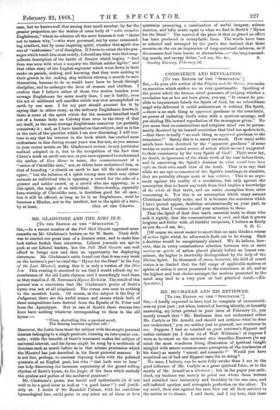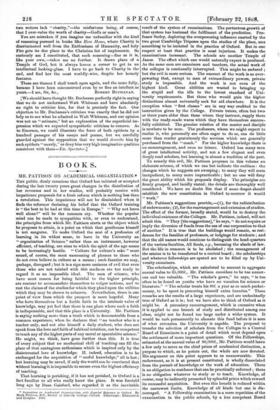MR. BUCHANAN AND HIS REVIEWER. [To THE EDITOR OF THE
" SPECTATOR."] SIR,—I hardly expected to have had to complain of unmannerli- ness on your part ; yet when, instead of leaving silently, or honestly answering, my letter printed in your issue of February 15, you merely remark that " Mr. Buchanan does not understand either Mr. Carlyle or Mr. Arnold, and should not criticize what he does not understand," you are neither just to yourself, nor courteous to me. Suppose I had so retorted on your reviewer's flippant and unfair estimate (as I deem it) of Walt Whitman ? or suppose I were so to retort on the reviewer who describes Emerson (to my mind the most wondrous living illustration of spiritual insight mingled with severe common-sense perception of the tendencies of his time) as merely " unreal and romantic ?" Would you have acquitted me of bad and flippant taste for so doing?
No man, I believe, can be more fully awake than I am to the good influence of Mr. Carlyle as a great spiritual force, or to the merits of Mr. Arnold as a dilettante ; but in the paper you criti- cized, my business was merely to point out where these writers had subsided into insincerity and brutality in the one case, and self-inflated egotism and retrograde perfection on the other. To my mind, their sins against the race blot out all their services to the nation or to classes. I said there, and I say here, that these
two writers lack "charity,"—the misfortune being, of course, that I over-value the worth of charity—God's or man's.
You are mistaken if you imagine me unfamiliar with the kind of reasoning pursued in books like Ecce Homo, where Charity is discriminated well from the Enthusiasm of Humanity, and holy Fire gets its due place in the Christian list of implements. So curiously am I constituted, that such reasoning—fine as it is, like your own, —takes me no further. It draws plans of a Temple of God, but it always leaves a corner to get in an intellectual looking-glass. I have to go back to Charity in the end, and find her the most worldly-wise, despite her homely features.
These are themes I shall touch upon again, and the more fully, because I have been misconstrued even by so fine an intellect as
[We should have thought Mr. Buchanan perfectly right in saying that we do not understand Walt Whitman and have absolutely no right to criticize him, for that is precisely the fact. Our objection to Mr. Buchanan's criticism was exactly that he did not help us to see what he admired in Walt Whitman, and our opinion was not an " estimate," but an explanation of the superficial im- pression which we expected sympathetic criticism to remove. As to Emerson, we could illustrate the force of both epithets by a hundred passages of his essays and poems, but we carefully guarded against the supposition that we would describe him by such epithets " merely," or deny him very high imaginative qualities consistent with them—ED. Spectator.]



































 Previous page
Previous page